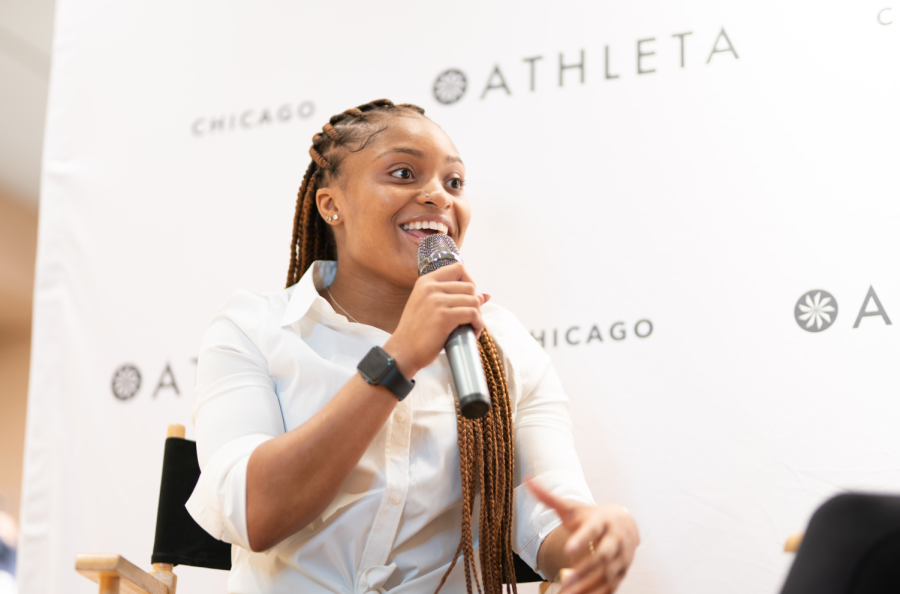Putting women on first base: Student creates podcast for female athletes
Photo courtesy of Aniyha Jones
Aniyha Jones, junior in Business, speaks at an Athleta event in Chicago on Sept. 27. Jones created the podcast “You’re Wrong, Sir” with its purpose to educate people and give those an outlet for their thoughts to be heard in regards to the sports industry.
Mar 29, 2022
Historically, sports have long been male-dominated, and today as sports commentary evolves across various media platforms, men seem to be primarily the ones sitting in front of the microphone.
However, one student at the University aims to change that.
In the summer of 2020, Aniyha Jones, junior in Business, began a podcast called “You’re Wrong, Sir” with the intent of bringing a Black woman’s voice into the white, male-dominated sports industry and uplift and empower female athletes.
Jones said her mission is to educate her audience and give them a medium to voice their stories that are often unheard and unthought about.
“I have a passion for interviewing people and telling powerful stories,” Jones said. “For me, I’m more so concentrated on people within the sports industry.”
Get The Daily Illini in your inbox!
Growing up, Jones said she was active in many sports and describes her younger self as super active. But despite a clear desire to pursue athletics, Jones initially planned to be a lawyer.
However, Jones said she could not stop thinking about playing sports, and she wanted to find a way to integrate sports with business.
“I know I want a business degree, but how do I figure out how to integrate my passion for sports with business?” Jones said.
Jones soon found the answer by creating a sports-related podcast. By doing this, she could continue to do what she loved and integrate it into her life in a way that was most meaningful to her and also impacted others.
Women are strikingly underrepresented in the sports industry, especially within sports commentary. According to a September 2021 report by ESPN, only 14.4% of sports reporters are women. Joshua Grady, an NFL agent and marketing representative, said despite facing underrepresentation, women in sports like Jones keep making history.
“The role of women and people of color in the sports industry at this moment continues to ‘break glass ceilings’ as Aniyha would say,” Grady said. “In other words, they continue to go above and beyond the status quo that society has placed and they set new standards that those coming after us can aim for.”
Jones is passionate about exposing racial inequalities when it comes to profiteering off athletes’ labor. She said the book “40 Million Dollar Slaves,” by Black journalist William C. Rodden influenced much of her thinking.
“He talks about the exploitation of African American people at the hands of white individuals who profit off of our muscles and our talent,” Jones said. “We lack ownership over the things that we are doing. For me, what’s missing is education. I think in our communities, especially as African American people, we typically luring our children to play two specific sports if we’re being real. Its football. Its basketball.”
Jada McDuffey, a student at the University of Wisconsin, is one of Jones’ closest friends. She explained her and Jones’ belief on the role successful athletes have in bettering communities.
“I believe that an ultimate goal for people of color within any industry should be to create better opportunities for, and give back to their respective communities,” McDuffey said. “Aniyha and I often have this conversation about notable people within sports. It’s important for those who have achieved success to not only be an inspiration but also a pillar for the communities that they’ve come from,” she said.
Jones said she recognizes racist and powerful organizations that silence Black individuals. According to her, it is important her community has more of a voice and more ownership.
“The issue that we have is we don’t educate ourselves enough to not be surprised,” Jones said. “You wouldn’t be shocked if you learned why these organizations started and what was at the foundation.”
Jones also said systemic racism controls which position Black athletes would play.
“When you integrate African Americans into the leagues, (management would) put them in positions that got the most abrasion and the most physicality,” Jones said. “So wide receiver, you put them at D-line (defensive line) ad then you put ‘Tom Bradys’ as quarterbacks who are thought to be smarter and therefore more protected.”
Grady, who has worked with Jones for the past two years, praised Jones for her hard work.
“If I could describe Aniyha in one word it would be ‘ambitious,’”Grady said. “She is driven beyond belief and has goals that most people would never even dream of.”
Mark Wolters, professor in Business, spoke about how Jones’ aspirations set her apart from her peers.
“I feel Aniyha has been an excellent role model for many young women and people of color who want to get into the sports entertainment industry,” Wolters said. “From listening to sports podcasts to watching sports on TV or listening to sports radio, there are not a lot of women who are the main voice. With Aniyha, she is creating her own brand and her own voice that is centered on her opinions and knowledge of sports. She is the host and center of her programs, not just a co-host or moderator.”
For Jones, education is paramount. She said education is the first step toward inclusion.
“With education, you have to be enlightened first,” Jones said. “Because a lot of people are ignorant, and when you take ignorance out of the equation, educate people and enlighten them, you see how competence equals confidence. So, when people learn to understand things and they get confident in what they’re saying there’s is a different type of confidence to take ownership and know that you can profit off of whatever your talents are.”






